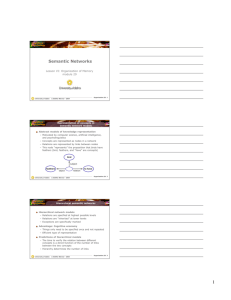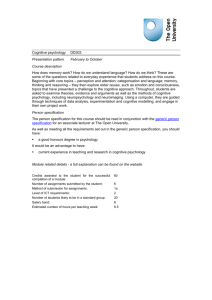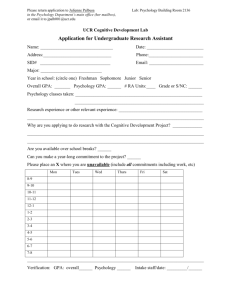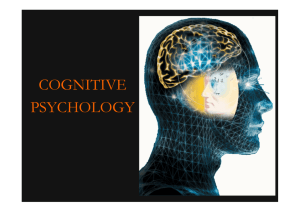History of Cognitive Psychology and its Relation to other Fields
advertisement
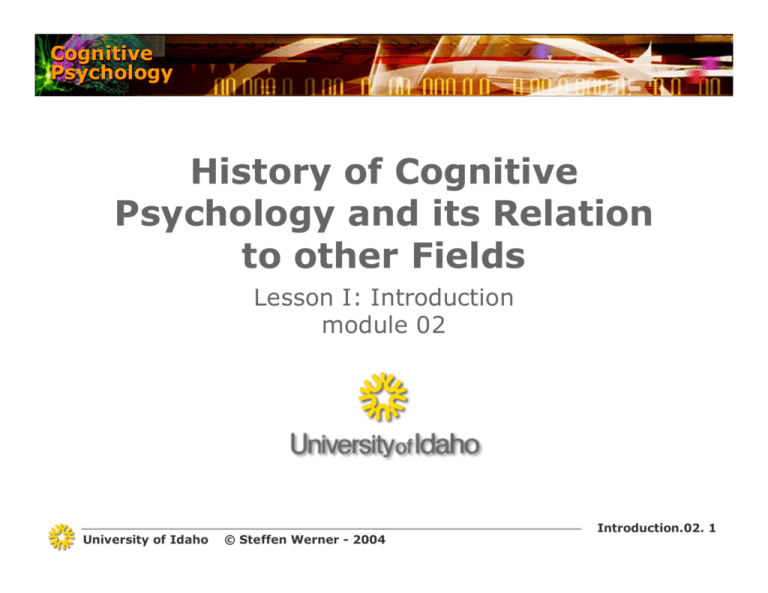
Cognitive Psychology History of Cognitive Psychology and its Relation to other Fields Lesson I: Introduction module 02 University of Idaho © Steffen Werner - 2004 Introduction.02. 1 Cognitive Psychology Precursors of modern cognitive psychology until 1950 Roots in philosophy – Plato, Aristoteles, Descartes, Locke, …. Experimental Psychology developed in the late 19th century out of …. – Philosophy – Physiology / Biology / Medicine Structuralism Functionalism Gestalt psychology University of Idaho © Steffen Werner - 2004 Introduction.02. 2 Cognitive Psychology The beginnings Fechner (1860) – “Elements of psychophysics” Wundt (1879) – First psychological laboratory in Leipzig Ebbinghaus (1885) – “Memory: A contribution to experimental psychology” James (1890) – “The principles of psychology” University of Idaho © Steffen Werner - 2004 Introduction.02. 3 Cognitive Psychology Gustav Theodor Fechner: Elements of Psychophysics Relating the physical world to our experience of it The experienced intensity of a stimulus (e.g., brightness, loudness, weight, size) is proportional to the logarithm of its physical dimension E = k * log S University of Idaho © Steffen Werner - 2004 Introduction.02. 4 Cognitive Psychology Wilhelm Wundt: The founding of experimental psychology What are the elements of our thoughts? Represents the start of experimental psychology (1876 in Leipzig, Germany) Focus on physiological psychology, psychophysics, and higher mental processes Preferred method: Introspection and systematic experimentation University of Idaho © Steffen Werner - 2004 Introduction.02. 5 Cognitive Psychology Edward Bradford Titchener: Structuralism and the elements of thought Systematic introspection: Psychology as the study of experience from the point of view of the experiencing individual Trained observers were to report their“pure” sensations Structure of cognitive events was supposed to be analyzable similarly to chemistry as the combination of different elements University of Idaho © Steffen Werner - 2004 Introduction.02. 6 Cognitive Psychology Hermann Ebbinghaus: The mechanism of human memory First systematic study of human memory Quantification of forgetting and learning by studying nonsense syllables University of Idaho © Steffen Werner - 2004 Introduction.02. 7 Cognitive Psychology William James Equivalent of Wundt for American psychology Functionalism: Focus on psychological processes and their function / relevance for human behavior Philosophical approach in contrast to Wundt’s empirical approach University of Idaho © Steffen Werner - 2004 Introduction.02. 8 Cognitive Psychology Brief history of cognitive psychology Watson (1913) “Psychology as the behaviorist sees it” – Discards introspection as method – Rejection of mentalism discards consciousness and other references to mental phenomena – Emphasizes the functional relation between physical world and behavior STIMULUS -> RESPONSE – The human mind as a “black box” – Reliance on animal models University of Idaho © Steffen Werner - 2004 Introduction.02. 9 Cognitive Psychology Brief history of cognitive psychology Skinner (1938) “The behavior of organisms” – Strong voice of neo-behaviorism – Focus on operant conditioning – Agreement with Watson on the type of behaviorist psychology – “The organism as the function between the stimulus and the response” – Behaviorism ruled American experimental psychology for the first half of the century University of Idaho © Steffen Werner - 2004 Introduction.02. 10 Cognitive Psychology Wolfgang Köhler: Gestalt psychology Köhler (1917) “The mentality of apes” University of Idaho © Steffen Werner - 2004 Introduction.02. 11 Cognitive Psychology Wolfgang Köhler: Gestalt psychology Köhler (1917) “The mentality of apes” – "Sultan tries to reach the fruit with the smaller of the two sticks. Not succeeding, he tears at a piece of wire that projects from the netting of his cage, but that too is in vain... He suddenly picks up the little stick once more, goes up to the bars directly opposite the long stick, scratches it towards him with the ‘auxiliary,’ seizes it, and goes with it to the point opposite the objective (the fruit), which he secures." – The solution of a problem requires not just the gradual accumulation of new facts, but the reorganization of existing facts into a new,coherent structure. University of Idaho © Steffen Werner - 2004 Introduction.02. 12 Cognitive Psychology Tolman: Expanding behaviorism Tolman (1948) “Cognitive maps in rats and men” – Re-introduction of mentalistic concepts University of Idaho © Steffen Werner - 2004 Introduction.02. 13 Cognitive Psychology The cognitive revolution Re-emergence of cognitive themes – such as memory, attention, problem solving – The human as an “information processor” Important works – Shannon (1948) “Information theory” – Hebb (1949) “The organization of behavior: A neuropsychological theory” – Miller (1956) “The magical number 7 plus or minus 2” – Broadbent (1958) “Perception and communication” – Chomsky’s (1959) critique of Skinner’s (1957) book “Verbal behavior” – Newell & Simon (1961) “Computer simulation of human thinking” – Neisser (1967) “Cognitive psychology” University of Idaho © Steffen Werner - 2004 Introduction.02. 14 Cognitive Psychology The cognitive revolution: Experimental Psychology Re-emergence of classical topics, such as … – Attention – Memory – Language – Thinking – Problem solving Strict methodological principles – Experimental method, factorial designs – Processing speed: Reaction times – Accuracy: Error rates – Motor behavior – Simulations and modeling University of Idaho © Steffen Werner - 2004 Introduction.02. 15 Cognitive Psychology The cognitive revolution: Psychobiology / Neuropsychology Understanding and growing interest in … – Localization of high-level brain function – Neuro-surgery and pharmacology – Functional organization of cell assemblies – Modeling of neural processing Refinement of neuropsychological methods – Electroencephalography (EEG) to record brain activity in vivo – Cortical stimulation during neuro-surgery – In-vivo cell recordings of cortical neurons University of Idaho © Steffen Werner - 2004 Introduction.02. 16 Cognitive Psychology The cognitive revolution: Computer Science and Artificial Intelligence The developing computer metaphor for cognitive processing … – Data storage vs.data processing – Parallel vs. serial processing – Representation formats – Development of high-level programming languages (e.g., PROLOG, LISP) – Computer simulations of thought (problem solving) – Artificial intelligence Nascent of information sciences … – Quantification and formalization of information – Mathematical models of information processing University of Idaho © Steffen Werner - 2004 Introduction.02. 17
